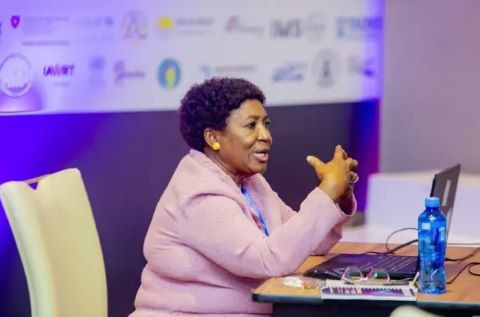
GCED Basic Search Form
Quick Search
You are here
News

Empowering women in media is not just a goal – it is a necessity
15 May 2025
From the newsroom floor to digital platforms, the call to amplify women’s voices in media took center stage during World Press Freedom Day 2025 in Arusha, Tanzania. A standout moment came during the session “Breaking Barriers – Gender, Media, and the Digital Age,” co-organized by UNESCO Dar es Salaam office, the International Association of Women in Radio and Television (IAWRT), and the Journalists Workers Union of Tanzania (JOWUTA). The session created a safe and inclusive space for women journalists to share their lived experiences—shining a light on the realities of online harassment, gendered disinformation, editorial gatekeeping, and systemic underrepresentation. These powerful accounts underscored a fundamental truth: press freedom cannot exist without gender equality.
True press freedom cannot exist without gender equality. As we shape the future of media in a rapidly changing digital world, we must ensure that women’s voices are not only heard but also lead the conversation. This dialogue is about more than representation - it's about transforming power structures to build a media landscape that is inclusive, ethical, and resilient.
Nancy Angulo
Communication and Information Sector, UNESCO Tanzania
The conversation did not stop at identifying problems. Participants put forward bold, strategic recommendations to foster gender equity in the media and digital landscape, including:
- Adopting gender-sensitive digital safety protocols across media platforms.
- Implementing gender audits in newsrooms and AI systems to detect and reduce bias.
- Strengthening oversight and developing ethical frameworks for AI and algorithmic content regulation.
- Increasing the representation of women in media content, leadership roles, and tech innovation.
- Building stronger ties between media professionals and human rights defenders to enhance coordinated responses to threats against journalists, improve access to legal and psychosocial support, and strengthen collective advocacy for press freedom and journalist safety.
- Raising awareness about legal services available to journalists, especially at the grassroots level, to ensure timely protection and support, particularly in rural and marginalized environments.

Participants urged a shift from simply empowering women in media to enabling agency—giving women the tools, confidence, and platforms to lead. This includes investing in media literacy, public speaking, and digital skills training that allow women to participate fully and safely in public discourse.
“It’s not just about training media to give women a voice,” one speaker noted. “It’s about training women to have the confidence and tools to use that voice.”
While building capacity in newsrooms is vital, it is equally important to equip women leaders to step confidently into the media spotlight. “Capacity building for journalists is crucial,” said one participant, “but equally important is empowering women with the courage and tools to be heard.”
This call for intersectional inclusion—spanning women, youth, and persons with disabilities—resonated across other sessions on AI governance, child-friendly media, and election coverage. These voices were not treated as vulnerable beneficiaries, but as critical agents of democratic transformation.
UNESCO’s support for bridging gender equity and digital transformation is at the heart of its commitment to building inclusive, resilient, and forward-looking media systems. Through its ongoing partnerships, UNESCO is helping to establish a new norm—one where gender, disability and youth inclusion are not side issues, but core pillars of media development and foundations of democratic and development discourse.
As Tanzania continues to advance in AI integration, media innovation, and policy reform, the message from Arusha is clear: A strong, resilient media sector depends on inclusive participation, ethical standards, and a collective commitment to safeguarding press freedom.
URL: https://www.unesco.org/en/articles/beyond-headlines-call-gender-inclusion-and-safer-digital-spaces
